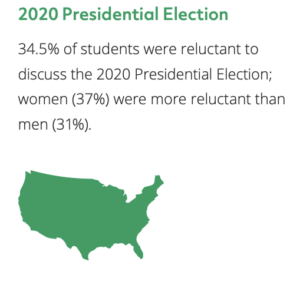Promoting Open Inquiry, Viewpoint Diversity, and Constructive Disagreement on American College Campuses and in the Disciplines
In 2020, More Students See a Climate of Self-Censorship
 College students are increasingly reluctant to share their views on topics like politics, religion, and sexuality, according to a new report issued by Heterodox Academy, a nonpartisan collaborative of nearly 5,000 professors, administrators, K-12 educators and graduate students that promotes open inquiry, viewpoint diversity and constructive disagreement in institutions of higher learning. The group’s 2020 Campus Expression Survey, one of a series funded by the John Templeton Foundation, showed that 62 percent of sampled college students agreed that the climate on their campus makes students reticent to say what they believe — a 7 percent increase over the previous year’s results.
College students are increasingly reluctant to share their views on topics like politics, religion, and sexuality, according to a new report issued by Heterodox Academy, a nonpartisan collaborative of nearly 5,000 professors, administrators, K-12 educators and graduate students that promotes open inquiry, viewpoint diversity and constructive disagreement in institutions of higher learning. The group’s 2020 Campus Expression Survey, one of a series funded by the John Templeton Foundation, showed that 62 percent of sampled college students agreed that the climate on their campus makes students reticent to say what they believe — a 7 percent increase over the previous year’s results.
In 2020, Heterodox Academy surveyed 1,311 students at hundreds of colleges and universities across the U.S. The sample was stratified by region, race, and gender based on broader national student demographics in order to provide the most accurate national snapshot of student sentiment. In the formal report outlining the survey results, researcher Melissa Stiksma writes that students were most reluctant to talk about politics (42%) and religion (31%), but an increasing number (15%) said they were reluctant to speak out in class about even non-controversial topics. On average, students who identified as Republicans (and to a lesser degree those who said they were Independent) reported being more reluctant to discuss most topics in class than their peers who identified as Democrats.
2020 Problems
2020 was by many measures an exceptional year, with students roiled by a global pandemic, a hotly contested presidential election, a national racial justice movement, and a massive shift to remote learning (with 68% of respondents taking classes mostly online). Interestingly, Stiksma says that students’ increased reluctance to speak in 2020 didn’t seem to be solely related to the difficulties of handling classroom discussions over digital platforms. “I looked at the frequency of reluctance compared to students who are in-person versus online,” Stiksma says. “We wanted to understand if people were just nervous about talking in an online setting. But that didn’t seem to make as much of an impact.”

Image courtesy of Heterodox Academy
When asked why they felt reluctant to give their views on controversial topics, the most common student response was that other students would criticize their views as offensive (60%), although various concerns relating to their professors’ responses (29-33%) and social media backlash (31%) were also frequently noted. Students also reported being more reluctant to speak up about topics they felt they were less directly affected by. On race, 13 percent more White than Black students expressed reluctance to share their views. More straight students were reluctant to discuss gender or sexual orientation than their lesbian, gay or bisexual peers. Higher percentages of atheist and agnostic students felt reluctant to talk about religion. When asked why, one survey respondent put it simply: “My views are not as relevant as those of students affected by discrimination in that area.”
Constructive Disagreement
Heterodox Academy was founded in 2015 by psychologist Jonathan Haidt, sociologist Chris Martin, and legal scholar Nicholas Rosenkranz because all three worried that a lack of ideological diversity within their disciplines was impacting the quality of research. They didn’t want scholars or students to have to self-censor for fear of offence or irrelevance. “Heterodox Academy really pushes to promote the line of wanting there to be constructive disagreement and great conversation on college campuses,” Stiksma says. The annual Campus Expression Survey aims to help students, teachers, and administrators better understand the intellectual climate at their institutions and think clearly about what might be done to improve it. Heterodox Academy also makes their survey questions and methodology available to any institutions who might want to do their own targeted campus surveys. They also provide tools and resources for students, teachers, administrators, and staff at the K-12 and university levels to help cultivate environments conducive to respectful and open discussion, viewpoint diversity, and open inquiry. These tools and resources range from recommended materials like a Political Polarization Resource List to classroom activities and guides like Creating Connection to Generate Deep Discussion.

Image courtesy of Heterodox Academy
In addition to repeating the baseline questions from the inaugural 2019 Campus Expression Survey, the 2020 edition included specific questions about the U.S. Presidential election as well as the Black Lives Matter movement. For both topics, the political polarization of responses was even more pronounced than in the more general topics of politics or race. When it came to Black Lives Matter, more than three times as many Republican students were reluctant to voice their opinions, compared to their Democrat peers. “That number is concerning for everyone, no matter your political affiliation,” Stiksma says. “We need both sides talking about the issues to make any progress.”
Still Curious?
Visit the Heterodox Academy website and read the 2020 and 2019 Campus Expression Survey reports.
Readers are invited to submit questions about the reports and the underlying data at questions@heterodoxacademy.org.